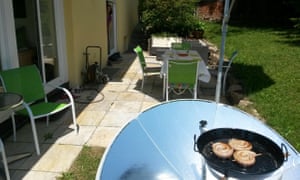Source: theguardian.com
Published: January 5, 2017

The Water&Solar100 cooker, which has automatic sun tracking, and temperature and timing controls. Photograph: Wilfred Fritz
Solar cookers have been promoted as a safe alternative to boil water, cook food, or even sterilise medical equipment, but many require the user to move the unit so that its focal point is in direct line with the sun. It is a seemingly simple move, but critics claim it has tended to deter users from cooking with them.
Roughly 3 billion people worldwide still cook on open fires or solid fuel stoves, according to the World Health Organisation, which estimates more than 4 million people die every year because of household pollution associated with such cooking measures.
To address the inconvenience of using a standard solar cooker, South African electrical engineer Wilfred Leslie Owen Fritz has spent the past year developing a version that tracks the sun’s rays automatically, allowing the user to leave it in the same place.
“Imagine all the times in a day when you would have to move the unit – it’s annoying,” says Fritz. “If you don’t adjust the unit, then it doesn’t heat the pot or pan. So even if communities get 1,000 of these cookers donated to them, they end up using them to cover holes in their roofs or as dishes for the animals to eat from. Then they go back to their other methods for fuel: wood or paraffin or even electricity, if a grid is nearby.”
Working alongside colleagues and students at the University of Stuttgart in Germany, and Cape Peninsula University of Technology in South Africa, Fritz has designed a solar cooker with automatic sun tracking, and temperature and timing controls. While working on the cooker, he realised it would be more efficient if it could also purify water and sterilise medical equipment – then it would have both commercial and household uses.
Water&Solar100, as they named it, is lightweight, foldable and portable, and can generate electricity, charge batteries and sterilise water and medical instruments in rural areas where alternative equipment is unavailable.
“You can place our unit anywhere in the world – from the inner city to Alaska – and when the sun comes up, it will automatically track where the sun’s rays are most concentrated and then follow that path. You do not need to move it, you just place it. You can also leave your food on [the cooker], and as soon as the temperature gets too high, it moves the focal point away [for you] so that your food remains at the temperature you have set for it.”
The oven’s combination of timer and temperature controls enables users to set a required heat (low, medium or high) for their dish along with the time required. “If you know your meal will take 30 minutes to cook, you put your pot on to our solar stove and then you can go off and do something else,” says Fritz.
The cooker is being piloted in various locations, including a Cape Town orphanage, a rural South African farming community, a low-income housing scheme and a German research lab.
Although each unit costs €200 (£168) to produce, much of that cost is due to production being in China, says Fritz, who estimates that unit costs would decrease by 50% if production were moved to South Africa.
While the oven is created to focalise the sun’s rays, Fritz has also developed a wider version that would allow for larger, more effective use. “That doesn’t create a focal point but a focal line, which means you can place pots and pans side by side,” he says. “If you let water flow through a pipe on that line, then it automatically gets purified at 100C. This is useful for rural areas where water is not potable, or for hospital systems.” The Cape Town orphanage is using the cooker to heat its water system.
For Fritz and fellow oven innovator Deon Kallis, both of whom grew up under apartheid in marginalised communities with little access to running water, electricity or proper medical services, their solar cooker is just one way to improve living conditions for millions of people across South Africa.
Ultimately, Fritz hopes to develop a system that can be used by clinics and hospitals across South Africa and the continent. “Our personal goals are to use sustainable practices, such as solar and others, to address life-threatening issues across the globe,” he says.
